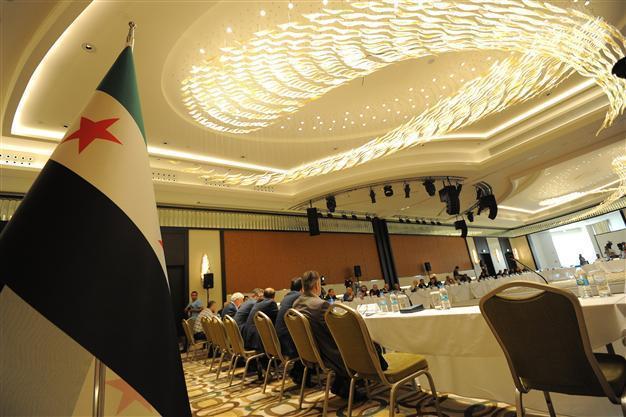Syrian opposition to choose prime minister in push for credibility
ISTANBUL - Reuters

The Syrian opposition gathered in Istanbul on Sept. 13. DAILY NEWS photo, Emrah GÜREL
The Syrian opposition coalition will appoint a provisional prime minister on Sept. 14 to raise its international credibility as high-stakes diplomacy plays out between Washington and Moscow to resolve Syria's two and a half year civil war, National Coalition officials said.After a week of intense international negotiations that threatened to sideline the Western and Arab backed coalition in the wake of a nerve gas attack on Damascus that killed hundreds of people, coalition officials said they reached consensus that Ahmad Tumeh, an independent Islamist, will be appointed to run rebel-held areas where a decline into chaos threatens to undermine the opposition to President Bashar al-Assad.
"We will be appointing a new prime minister tomorrow. It will be the first item on the agenda," coalition spokesman Khaled Saleh told reporters after the first day of a meeting of the 115-member coalition.
The coalition has struggled to form a coherent response to a Russian initiative that proposes al-Assad hands over the country's massive chemical weapons arsenal in return for averting a threatened U.S.-led punitive strike.
"The Russian initiative is silent on the very first issue on ensuring accountability. Providing and reaching political solutions does not absolve the regime from the fact that it killed 1,466 innocent civilians," Saleh said.
Al-Assad denies responsibility for the gas attacks, which hit rebel-held districts.
Russia and the United States agreed on a new push to negotiate an end to Syria's civil war on Sept. 13 by reviving an international plan for a "Geneva 2" conference.
The original drive for a political solution to the conflict, dubbed the "Geneva" plan and calling for a transitional government with full power, went nowhere as al-Assad refused to cede power, and the opposition insisted that he could not be a part of any new political order in the country.
Opposition 'still willing talks'
Coalition member Khaled Khoja said the opposition was still willing to enter into talks with the al-Assad government if the balance of military power was redressed.
"We are not against Geneva 2, but not under these conditions. The balance of power is not right now. What would restore it is either an air strike or weapons for the Free Syrian Army," Khoja said, referring to more sophisticated anti-tank and anti-aircraft weapons that rebel brigades generally lack.
Selim Idris, the head of the Supreme Military Council, denied media reports that the first shipment of U.S.-supplied weapons arrived in the past few weeks. The Obama administration authorised giving weapons to the Supreme Military Council in June following several smaller chemical weapons attacks it blamed on al-Assad's forces.
"We would like to know where these weapons are," Idris said.
Although not a member of the coalition, Idris has emerged as an influential player with a bloc of 15 members expected to support Tumeh's prime ministerial bid.
Tumeh was due to be named on Sept. 13, but several members asked to postpone the vote until Sept. 14 in an attempt to "derail the process." Ahmad Jarba agreed, hoping that this would buy time to secure more votes for Tumeh, coalition sources said.
The coalition appointed a Qatari-backed candidate as provisional prime minister earlier this year, but he could not form a government and had to resign as the coalition expanded and Saudi Arabia replaced Qatar as the Arab country with the most influence on the group.
'Pressure to raise credibility'
An aid to Tumeh said: "Do not expect the liberated areas to be transformed overnight. The opposition is under international pressure to raise its credibility, and the idea is that the coalition will become more of an assembly, while the government acts as an executive."
Another coalition source said: "The international powers are talking while the coalition is nowhere to be seen. Electing someone like Tumeh will raise its profile."
Tumeh, 48, is the secretary general of the Damascus Declaration, a group of veteran opposition figures who led a peaceful resistance to Assad before the revolt. A moderate Islamist from the eastern tribal province of Deir al-Zor, Tumeh was jailed several times during the uprising and was forced to flee the country earlier this year.
He was imprisoned from 2009 to 2011 along with 11 prominent opposition members who had demanded that Assad embark on democratic change in the country, which has been ruled by the his family since 1970.
Tumeh has worked closely with liberals and Islamists alike, including Riad al-Turk, the main political figure in the Damascus Declaration, who at 82 still operates underground in Syria, despite spending a total of 25 years as a political prisoner.
















